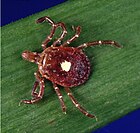Demodecidae: Difference between revisions
Content deleted Content added
taxobox cleanup |
EricLaporte (talk | contribs) m lien |
||
| (5 intermediate revisions by 5 users not shown) | |||
| Line 4: | Line 4: | ||
| image = |
| image = |
||
| taxon = Demodecidae |
| taxon = Demodecidae |
||
| authority = [[ |
| authority = [[Hercule Nicolet|Nicolet]], 1855<ref>Histoire naturelle des Acariens qui se trouvent aux environs de Paris. MH Nicolet, Arch. Mus. natn. Hist. nat. Paris., 1855</ref> |
||
| diversity_link = |
| diversity_link = |
||
| diversity = |
| diversity = 8 genera, c. 65 species |
||
| subdivision_ranks = Genera |
| subdivision_ranks = Genera |
||
| subdivision = |
| subdivision = |
||
*''[[Apodemodex]]'' |
*''[[Apodemodex]]'' |
||
*''[[Demodex]]'' |
*''[[Demodex]]'' |
||
*''[[Miridex]]'' |
|||
*''[[Ophthalmodex]]'' |
*''[[Ophthalmodex]]'' |
||
*''[[Pterodex]]'' |
*''[[Pterodex]]'' |
||
| Line 18: | Line 19: | ||
}} |
}} |
||
'''Demodecidae''' is a family of parasitic [[mite]]s, living on various species of [[mammal]]s. Each species of mite is usually only found on a single mammal species, whereas a mammal species can have several different species of demodecid mites living on it.<ref name="IzdebskaRolbieckiFryderyk2016">{{cite journal |last1=Izdebska |first1=Joanna N. |last2=Rolbiecki |first2=Leszek |last3=Fryderyk |first3=Slawomira |title=A new species of ''Demodex'' (Acari: Demodecidae) from the skin of the vibrissal area of the house mouse ''[[Mus musculus]]'' (Rodentia: Muridae), with data on parasitism. |journal=[[Systematic & Applied Acarology]] |volume=21 |issue=8 |year=2016 |pages=1031–1039 |doi=10.11158/saa.21.8.4|s2cid=89058854 }}</ref> Many species of mites are restricted to very limited areas of their body, e.g. the [[Meibomian glands]], the ear canal, the tongue etc. |
'''''Demodecidae''''' is a family of parasitic and commensal [[mite]]s, living on various species of [[mammal]]s. Each species of mite is usually only found on a single mammal species, whereas a mammal species can have several different species of demodecid mites living on it.<ref name="IzdebskaRolbieckiFryderyk2016">{{cite journal |last1=Izdebska |first1=Joanna N. |last2=Rolbiecki |first2=Leszek |last3=Fryderyk |first3=Slawomira |title=A new species of ''Demodex'' (Acari: Demodecidae) from the skin of the vibrissal area of the house mouse ''[[Mus musculus]]'' (Rodentia: Muridae), with data on parasitism. |journal=[[Systematic & Applied Acarology]] |volume=21 |issue=8 |year=2016 |pages=1031–1039 |doi=10.11158/saa.21.8.4|s2cid=89058854 }}</ref> Many species of mites are restricted to very limited areas of their body, e.g. the [[Meibomian glands]], the ear canal, the tongue etc. |
||
The family was formerly named ''Demodicidae''. |
|||
==References== |
==References== |
||
Latest revision as of 15:30, 16 December 2023
This article relies largely or entirely on a single source. (November 2017) |
| Demodecidae | |
|---|---|
| Scientific classification | |
| Domain: | Eukaryota |
| Kingdom: | Animalia |
| Phylum: | Arthropoda |
| Subphylum: | Chelicerata |
| Class: | Arachnida |
| Order: | Trombidiformes |
| Superfamily: | Cheyletoidea |
| Family: | Demodecidae Nicolet, 1855[1] |
| Genera | |
| Diversity | |
| 8 genera, c. 65 species | |
Demodecidae is a family of parasitic and commensal mites, living on various species of mammals. Each species of mite is usually only found on a single mammal species, whereas a mammal species can have several different species of demodecid mites living on it.[2] Many species of mites are restricted to very limited areas of their body, e.g. the Meibomian glands, the ear canal, the tongue etc. The family was formerly named Demodicidae.
References[edit]
- ^ Histoire naturelle des Acariens qui se trouvent aux environs de Paris. MH Nicolet, Arch. Mus. natn. Hist. nat. Paris., 1855
- ^ Izdebska, Joanna N.; Rolbiecki, Leszek; Fryderyk, Slawomira (2016). "A new species of Demodex (Acari: Demodecidae) from the skin of the vibrissal area of the house mouse Mus musculus (Rodentia: Muridae), with data on parasitism". Systematic & Applied Acarology. 21 (8): 1031–1039. doi:10.11158/saa.21.8.4. S2CID 89058854.

